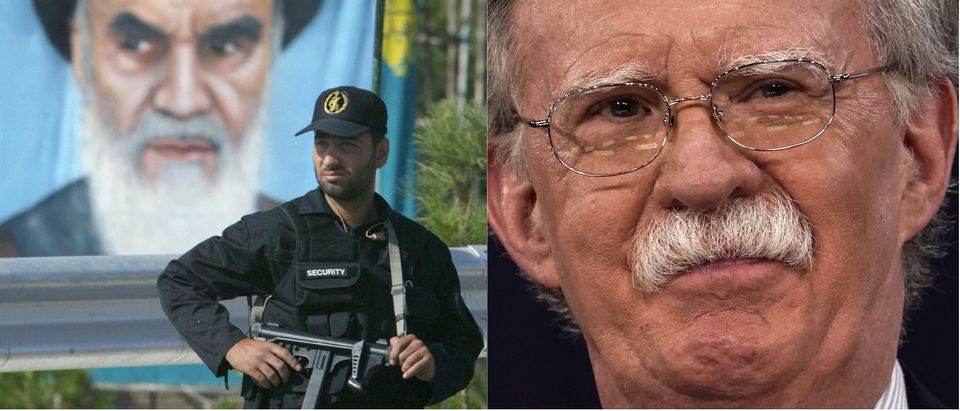The recent announcement that a fierce critic of authoritarian regimes, John Bolton, will follow H.R. McMaster by assuming the position of National Security Advisor, is further indication that the White House is embracing a more assertive U.S. posture toward the Islamic Republic of Iran than at any point since the 1979 Revolution. And Bolton’s rise may come at Tehran’s expense.
Many Iran analysts agree that the shift from a misguided policy of outreach and appeasement — most notably associated with the Obama administration but in vogue among bipartisan legislators since the mullahs seized power almost forty years ago — to a policy that challenge the regime’s continuance is a step in the right direction.
In articulating “a new foreign policy direction for our country, one that replaces randomness with purpose, ideology with strategy, and chaos with peace,” then-candidate Trump made headlines by indicating that it was “time to invite new voices and new visions into the fold.” It was the soon-to-be occupant of 1600 Pennsylvania Avenue’s first major national security address and may have heralded the ascension of officials in Bolton — in addition to current CIA Director and soon-to-be Secretary of State Mike Pompeo’s — mold.
Upon assuming the Oval Office, the new president showcased his Iran policy almost immediately when he put Tehran “on notice” over destabilizing activities in the broader Middle East. Shortly after, the president declared unequivocal support for the Iranian people’s demands for regime change.
The conclusion of Trump’s first year in office saw a series of countrywide demonstrations that spanned every major Iranian municipality. In chants directed at both “reformists” and “hardliners,” the protesters declared their frustration with their clerical rulers by shouting “the game is over.” The slogan became the clearest illustration of the misguided optimism long held by Western policymakers, with the exception of the Trump administration.
Against this backdrop, Bolton’s appointment should come as little surprise. The president’s selection could even be interpreted as a fulfillment of a campaign pledge to shift from longstanding policies that have proven erroneous and counterproductive.
Bolton’s entry into the administration signals Tehran that there will be serious consequences for the regime’s malign activities – whether against U.S. interests, regional adversaries, or internal dissidents. The administration’s strong rhetoric to date has already been successful in stopping the Iranian Revolutionary Guard Corps (IRGC) from harassing American ships in the Persian Gulf. The U.S. Navy reports that in contrast to the dozens of close encounters with IRGC fast attack vessels over the previous two years, there have been no incidents since August. This belies the Iranian regime’s bluster about its unwillingness to negotiate and its readiness to retaliate against U.S. policies that undermine the nuclear agreement or punish Tehran for its support of international terrorism.
To be certain, there is much that still must be done to curtail Iranian misconduct. Leveraging the discontent on the Iranian street will require bold action by U.S. officials and strategic assertiveness the likes of which Bolton is unquestionably comfortable.
But the massive anti-regime uprising presents a unique historical opportunity for the still young administration. Bolton is no doubt aware that, though the protests initially focused on the worsening economic conditions inside Iran, the demonstrations quickly metastasized and took on a sharply political tone with participants risking the possibility of arrest and even capital punishment by denouncing the supreme leader and calling for an end to the theocratic regime.
Tehran knows that the spell is now irretrievably broken. The Iranian opposition — led by the National Council of Resistance of Iran (NCRI), the regime’s parliament-in-exile and home to dissidents that reject clerical rule, including its largest constituent group, the People’s Mojahedin Organization of Iran (PMOI/MEK) — has been repeatedly blamed by Tehran for serving as the architects of the uprising for freedom. But the organized resistance is simply channeling the voice of the Iranian people.
The January protests for which Trump expressed strong support were widely regarded as the most substantial threat to the Iranian regime since the 2009 protests. Iranian Supreme Leader Ali Khamenei publicly acknowledged that the nationwide uprising was largely the result of organized efforts by the PMOI/MEK and that group is now seeking to extend the uprising into the Iranian New Year, which began this past week.
In a speech marking the Nowruz holiday, Maryam Rajavi, the president of the NCRI, called for a “year full of uprisings” with the ultimate goal of establishing democratic governance in the place of the clerical regime. Given the recent protests as well as continued labor strikes, the goal is within reach. But Tehran will be better able to expand its repressive activities if there is any decrease in the pressure it faces from U.S. officials.
The presence of John Bolton in the White House will ensure that the pressure campaign designed to push back on Tehran’s belligerence continues and that options for regime change are operationalized for the president’s consideration. If it is any assurance to Bolton’s partisan – and sometimes ill-informed – critics, his longstanding embrace of policies that actively support the Iranian people in their campaign for freedom from tyranny is likely to diminish, not increase, the specter of war with the Islamic Republic.
With consistent support from the White House, the Iranian people may finally achieve a new system of government that embraces not only democracy but also civil, political, religious and cultural liberty for Iranians of every demographic background. By articulating policies that will put an end to rule aby ayatollahs, the new National Security Advisor can support the ongoing rebellion by the Iranian people and support regime change in Tehran.
The avoidance of a future U.S. war depends on it.
Professor Ivan Sascha Sheehan is the incoming Executive Director of the School of Public and International Affairs at the University of Baltimore. Follow him on Twitter @ProfSheehan.
The views and opinions expressed in this commentary are those of the author and do not reflect the official position of The Daily Caller.


